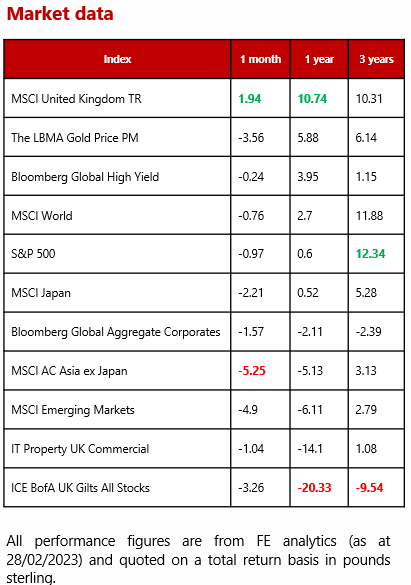United Kingdom - March 2023
We do love to weave in our theme; sometimes the theme comes from what we have written, and sometimes vice versa. We do, of course, always include what we feel is pertinent regardless of the theme. This month, we have written about fictional detectives. From Sherlock Holmes to Miss Marple, Columbo to Philip Marlowe, fictional detectives have entertained us from the page to the screen for more than a century. Whodunit – the smoking guns, the alibis and (for our purposes) the red herrings all form a vital part of the crime genre.
There are always questions, remember Columbo always had one more question. The first, has a crime been committed by central banks and if so, can we find out whodunit, and what are the red herrings? What are investors deciding – after all, we should always really talk about investors, not markets, as the latter only exist and move due to the actions of the former – and what next? Have central banks committed the crime of acting too late in tackling inflation, and/or are they now acting too aggressively for the economic conditions? Was too much stimulus, especially in the US, Europe and UK, around Covid-19 the real crime? Finally, are investors getting a clue from the inverted yield curves – where short-term money costs more than long-term – if nothing else, that a recession is coming?
Central banks, with hindsight (and indeed there were those saying it at the time) should have started to raise rates sooner, and probably in a more meaningful way, as inflation did rather more than peek from behind a tree. Now that interest rates are rising, just as inflation is seemingly coming off recent highs, and in the certain knowledge (as history shows) that the impact of each rate rise takes between 12 and 18 months to show in the economy, central banks have to ask, ‘Are the signs of inflation falling (possibly rapidly) red herrings or are they meaningful?’. If the latter, then we should say ‘done’. If not, then we have more work to do, and the rhetoric seems to be the latter as we publish this edition.
Now, equity markets, and the top 100 in the UK in particular, are rather less obviously affected by ‘local’ interest rates. However, with around 80% of earnings from overseas, the level of sterling against other currencies matter, so central bank – and government – actions do make a difference. When looking lower down the cap-scale in the London market, local conditions matter more.
We believe there is serious value in UK smaller companies, but that assessment does depend on a few conditions playing out in the coming six to 18 months.
We have a Budget due next week (15 March 2023) and investors do not need long memories (or to be detectives) to review how international investors reacted in late September 2022.
So the level of sterling matters; looking for clues in markets – second guessing investors – is never easy and there are perhaps more red herrings than usual around at the moment. We remain vigilant and are always interested in looking beyond the obvious; not every alibi is a good one, and sometimes, yes, the smoking gun did fire the shot we think it did.
North America - March 2023
After staging a strong rally, led by the most speculative assets and interest rate sensitive sectors, the last few weeks have brought a dose of reality to markets. A clutch of data suggesting the US economy remains strong and inflation stubborn has thrown equity investors but markets are far from pricing in this outlook to the same degree as the bond markets. Core inflation in services does not look as if it is falling and unemployment remains very low with workers enjoying high numbers of job openings and wage growth. If the Federal Reserve (Fed) is going to have to break the jobs market to get the ‘job done’ it looks as if tightening is not going to relent any time soon. As a result, expectations are now that rates could get to around the 5.4% mark before peaking and that we may not see any rate cuts this year. Given the importance of the ‘Fed pivot’ to the equity bull narrative, this is not helpful.
Sector leadership changed over February and looks very much like it did for most of 2022 in a sign that the playbook may be changing again. The rate sensitive sectors are again performing worst, with tech, consumer discretionary and real estate all labouring. This said, even the areas like healthcare, energy and utilities, which enjoyed a strong 2022, have lost ground as a general risk-off sentiment returns.
Excessive optimism over earnings and the prospect of a recession being avoided still make us uncomfortable.
Some commentators are talking of ‘no landing’ in the US, meaning no recession or significant drop off in GDP, but it would be remarkable if a rate tightening cycle ended with this outcome, especially given the complexity of the inflationary picture. Even if ‘no landing’ was plausible, the implications for rates would not necessarily mean a benign outlook for equity prices. A lot of the recent, positive data is lagging in nature of course and although a recession looks as if it has been delayed it is still likely to arrive in our view.
TV detective Colombo was played by Peter Falk who featured in the role from 1968 to 2003. His trademark outfit was a crumpled raincoat which was a permanent fixture apart from in one episode when he received a new one from his wife leaving him unable to ‘think properly’ and leading to him trying to lose it.
US equities remain expensive and the recent rally has made valuations look unjustified.
We still think we will get opportunities to invest at a more attractive entry point and as the geopolitical challenges continue the US may still prove to be one of the better performers over the medium term. For now, exposure remains highly selective and mostly via our preferred themes.
Europe - March 2023
Last month we wrote of the impressive returns from European equities despite the doom forecast by many in light of the Ukraine-Russia conflict and the energy crisis. There is no doubt that the way in which policy makers have responded to these challenges has been very helpful and investors have added to these positives with the re-opening of China’s economy. Whether this latter story will be enough to maintain Europe’s outperformance is debatable with doubts already surfacing, but the exposure of the continents’ exporters to the country means it is a rational way to play the story if one has faith in it.
German and French indices have moved to test new highs and even the much-hated European banks have produced an almost 20% return since the year began. The rotation in investor sentiment has also been helpful – Europe does not have much of a tech sector compared to the US and the move away from that segment of the growth style has meant that European stocks no longer have a disadvantage in this regard. Let’s not also forget the rather mundane point that a lot of money left Europe last year and some of it will perhaps inevitably return, keeping inflows healthy.
This aside, inflation remains the key topic as it is elsewhere. The European Central Bank (ECB) is maintaining a pretty hawkish tone and this month should see another 0.5% rise in rates. How much further rates then move is unknown but there is the sense that inflation is getting ‘embedded’ here as elsewhere, so the policy makers may not be able to ‘ease up’ as early as had been hoped. In Europe, the prospect of higher rates for longer also brings with it painful memories of the last sovereign debt crisis and, although this is far from most investors’ thoughts now, the strains placed on national budgets should not be forgotten. On earnings, let’s not forget that margins are probably not yet showing the full impact of higher supply costs, so there is no room for complacency.
Hercule Poirot is one of Agatha Christie’s longest running characters and the Belgian detective appeared in works published by the writer between 1920 and 1975.
We ensure that our approach to investing in Europe, as in other regions, takes into account the most appropriate investment vehicles given our outlook. This means that as well as having access to more growth-focused names, we can also target more income-oriented strategies or more defensive sectors where we think that is the right course of action. The region is quite attractive in offering the blend of these different opportunities and the quality of some of the multinationals is obviously world class.
No changes this month – relative outperformance may be sustained but a lot is priced in and all markets may face headwinds over the coming quarters.
Rest of the world - March 2023
At the National People’s Congress, China announced its economic expansion target for 2023 at the lowest level in over thirty years. The target of ‘around 5%’ is half a percent below that of the previous year and reflects a desire to ‘prioritise economic stability’. This target is a level which most advanced Western economies can only dream of achieving but for China it looks very achievable as the economy continues to re-open from the zero-Covid policy and household spending bounces back. As written about in previous editions of this commentary, while this growth may be achieved, we remain concerned about the debt levels in the housing market and the potential for government interference in companies.
Elsewhere in Asia, the Reserve Bank of India (RBI) has forecast growth for 2023-24 to be 6.4%, with the Government targeting above 7% for the next decade. India has benefited from large productivity gains under Prime Minister Modi, such as the move to nationwide sales tax, instead of a disjointed regional patchwork of taxes, as well as the use of digitalisation and cracking down on the shadow economy. Combining these factors with resilient demand from the domestic market has helped India to become one of the fastest growing major economies over the last year. While the Government’s most recent budget has been criticised by rivals as a series of giveaways ahead of the 2024 elections, the measures included have been in the main business friendly and incentivised infrastructure spending. India looks well placed, although a rise in commodity prices, an area where India relies heavily on imports, is a potential headwind in the near term.
It is also worth briefly covering the Adani scandal which has been in the news over the last couple of months. While the name may not be well known in the UK, it was one of Asia’s biggest companies and was rocked by US-based investment firm Hindenburg writing a short selling report (a short selling report is negative research about a company designed to be made public once the investment firm has taken a short position – which benefits from when prices fall – in the target company) alleging stock manipulation and fraud in its accounting methods. We will not go into details on the allegations or corporate responses – indeed this is likely to be the source of ongoing legal action – but it does again act as a reminder of the importance of due diligence and active management when selecting stocks, particularly in emerging markets.
We remain positive on the prospects for Indian equities and, while our concerns around government interference have led us to avoid single country China funds, we are positive on the economic picture here, preferring to access via Asia Pacific or broad emerging market strategies. Elsewhere we remain constructive on Japanese equities and Asia more generally.
Commodities - March 2023
After a strong post-pandemic run, as economies got ‘back-to-business’ and supply chain dislocations sent prices higher, commodity prices eased through 2022 as pent-up demand faded and trade backlogs eased. Investors in the space have been seeking the next leg-up, and the re-opening of China’s economy late last year has widely been seen as one potential catalyst.
China’s focus on Covid-19 avoidance, at the expense of economic growth, resulted in annual gross domestic product (GDP) of 3% in 2022, below the targeted 5.5%. Reopening of the world’s second largest economy was therefore widely welcomed. However, the exact impact of reopening was initially hard to quantity, uneven and reliant on a population that had spent several years determinedly avoiding infection suddenly throwing all caution to the wind.
Now, after a rapid wave of infection, China’s swift policy shift seems to have had the desired effect for the country’s economic revival. Data from China’s National Bureau of Statistics showed manufacturing activity in February expanding at its fastest pace since April 2012. Granted this is but one reading and a recovery from a low base but it may well set the tone for a shift back to economic expansion. With Chinese authorities also looking to provide stimulus to their beleaguered property sector, to prevent systemic risk, industrial metals could well benefit through 2023. Improved demand from the country could offset what is forecast to be weaker demand more broadly as many economies contract. Whether it will be enough to provide the pricing support the sector needs remains to be seen
In 1932, at the age of forty-four, Raymond Chandler became a detective fiction writer after losing his job as an oil company executive during the Great Depression. He is best known for the creation of hard boiled private eye Philip Marlowe.
Broadly, the outlook for the metals sector is uncertain and while we have some diversified exposure, for now we continue to prefer gold miners and additionally energy for higher risk investors. Gold miners offer exposure to small and mid-cap names where valuations remain attractive, margins are high, and where peak rates over the next 18 months could see a revival in the fortunes of the gold price.
Healthcare - March 2023
Investing in healthcare has proved to be something of a balm during turbulent markets and macroeconomic uncertainty. The ACWI Healthcare index, which includes a mix of large and mid-cap companies across 23 developed markets, returned 7.78% over a one-year period (to end February 2023). This can be compared to the broad global equity index, the MSCI ACWI, which delivered 1.67%. In the main, healthcare companies have not had to shoulder higher energy and basic material costs as their primary expenses are research and development, marketing, and lobbying. Pharmaceuticals also tend to be something of a haven during periods of high inflation given that, historically, big pharma companies have maintained margins of around 15-20% over the past 40 years.
A full examination of the sector however, reveals significant divergence within the underlying subsectors. There have been big winners and losers in the healthcare space, so security selection has been integral. Large pharmaceuticals and healthcare service companies have outperformed most global equities thanks to their defensive characteristics. Whereas biotechnology stocks have been pummelled by erratic market movements and expectations of higher for longer US interest rates. Biotechnology companies typically sport higher valuation multiples and are more growth-orientated. As such, they have a greater sensitivity to the monetary outlook, particularly in the US where most of these companies are located.
Did you know that Dr Mark Sloan and Adrian Monk exist within the same fictional universe? Diagnosis Murder, which starred Dick Van Dyke as Dr Sloan, proved so popular that it spawned a series of eight mystery novels. Characters from the second book, The Death Merchant, later reappeared in author Lee Goldberg’s Monk novels.
Within core portfolios, there is a specific exposure to a broad range of healthcare equities. This is a long-term position which we access via an unconstrained fund which can invest across the healthcare universe. At present, the portfolio remains tilted towards defensive large cap companies with the ability to switch towards biotechnology if the outlook for the wider economy improves.
Technology - March 2023
The once lauded technology sector has fallen on hard times of late. Although investor sentiment appeared to perk up in January, it soured once again over February as the apparent strength of the US economy dashed hopes that interest rates may have peaked. 2020 and 2021 proved to be a rising tide that lifted all boats for the sector, with investors piling in to high-growth, lossmaking companies which subsequently resulted in some dramatic falls from grace over the past year. It is now fair to question whether the US will return to the 14-year status quo of low interest rates anytime soon and as such, technology investors now have a greater focus on profitability and cash generation.
The sensational headlines focusing on technology company share price falls appears to have caused investor aversion for the sector overall. Our view is that there is a great deal of nuance within the sector. While we continue to eschew blue-sky, unprofitable companies, we believe there is an opportunity for several mega cap tech companies to outperform over the year. We currently have a preference for cash-generative companies providing essential services and digital security. Although there are a number of signs pointing to an economic slowdown ahead, our view is that well managed tech companies within these subsectors will benefit as companies continue to invest in IT during a downturn in order to maintain adherence to long-term strategy. Investment in technology tends to be prioritised by companies, indeed those that do so during a challenging period, tend to emerge stronger than competitors.
What if Sherlock Holmes was a blonde teenage girl with a laptop and a sassy attitude? This was the premise of the hit TV show Veronica Mars which principally aired between 2005 and 2007.
The show helped to launch the career of now well-known actress (and voice of Princess Anna in Frozen) Kristen Bell.
While we did reduce our exposure to technology equities across most portfolios last year, we maintain a healthy weighting towards the area as a long-term investment theme.
Fixed Income - March 2023
February delivered a timely reminder that the path of inflation in 2023 may not be as clear as previously anticipated. In the US, higher interest rate policy seemed to stem from surging inflation through the latter half of 2022. As the year progressed, consumer price inflation in the US was back to 2021 levels, having slowed from 9.1% in the year to June 2022, to 6.5% in December. Moving into 2023, the figure for January came in lower again, at 6.4%. However, this represented only a slight easing and was above forecast, leading financial markets to swiftly reprice future interest rate expectations.
There are signs that inflation could prove more stubborn than many had hoped. The issue for central banks remains in services, where prices continue to climb, supported by tight labour markets and wage growth. Conversely, goods inflation is seeing signs of a slowdown in price rises. Overall, this is resulting in core inflation, which strips out the volatile food and energy (where prices are now thankfully easing) elements, remaining frustratingly high. In the US the January core inflation reading was 5.6%, in the UK 5.8% and in the eurozone, it was 5.3%.
With certain inflation segments proving difficult to slow, investors now expect a higher terminal, or final, interest rate in the US. As such, bond prices across the globe registered notable falls in February as yields moved higher to reflect this. Whereas previously, there was expectation the Federal Reserve would start to cut rates towards the end of this year, that is now pushed into 2024. Essentially, the work of central banks may not yet be done. For us, rate volatility, or more broadly the uncertain timeline of peak then falling rates, has always been a consideration and we have looked to mitigate the sensitivity of our fixed income exposures to interest rates.
There is another twist to this story, namely that economic growth is proving resilient. The threat of a US recession, previously seen as a necessity to tame inflation, is seemingly lessened as the country’s economy demonstrates it can function under a higher rate environment. That brings a wider range of potential fixed income sectors into the conversation – are high yield bonds, where one lends to a lower quality issuer to receive a higher yield, looking more investable if recession is either avoided or mild? Similarly, if the US dollar remains stable or even strengthens again as the US rate hiking cycle is extended, is emerging market debt – which many have been positive on year-to-date – seen as less attractive?
Jessica Fletcher, the legendary sleuth of Cabot Cove, finds herself investigating the theft of $100,000 in bearer bonds in the episode ‘When Thieves Fall Out’. Given that bearer bonds – which are no longer issued by the US Treasury – are unregistered, it was a tricky case to solve.
For now, we retain a preference for high quality issuers, through exposure to US government debt and investment grade issuers. Regarding the latter, we receive a sufficient yield premium over cash and are reassured by the ability of these issuers to continue paying their coupons and maturity proceeds irrespective of economic conditions. Other fixed income sectors are now in the conversation as yields remain appealing.


The Monthly Market Commentary (MMC) is written and researched by Simon Gibson, Richard Smith, Scott Bradshaw, Mark Moore and Lauren Wilson for clients and professional connections of Mattioli Woods and is for information purposes only. It is not intended to be an invitation to buy, or to act upon the comments made, and all investment decisions should be taken with advice, given appropriate knowledge of the investor’s circumstances. The value of investments and the income from them can fall as well as rise and investors may not get back the full amount invested. Past performance is not a guide to the future. Mattioli Woods is authorised and regulated by the Financial Conduct Authority.
The MMC will always be sent to you by the seventh working day of each month, usually sooner, is normally delivered via email, and is free of charge as the MMC is generally made available to clients who have assets under our management in excess of £200,000, and to all clients under our Discretionary Portfolio Management Service (DPM). Normally, the MMC costs £397 + VAT per annum. Professional advisers and their clients should contact us if they are interested in receiving a monthly copy.
Sources: All other sources quoted if used directly; except fund managers who will be left anonymous; otherwise, this is the work of Mattioli Woods.





